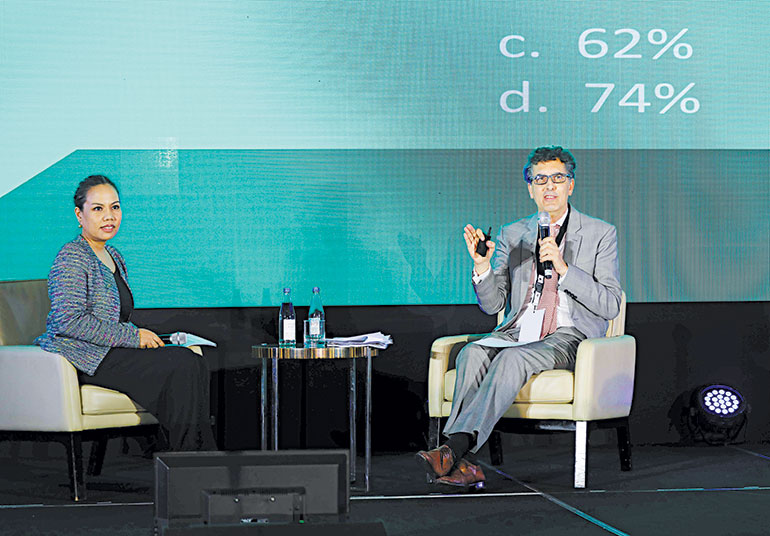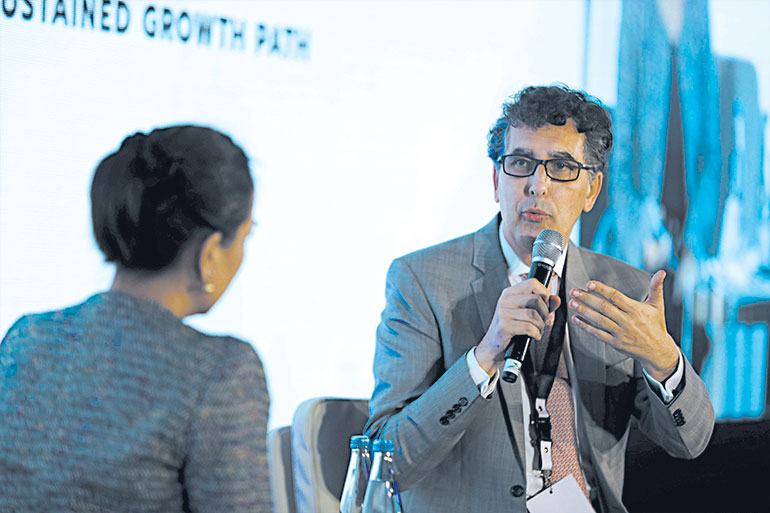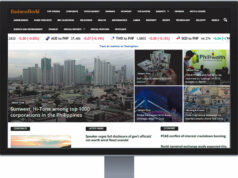Bridging the generational gap in today’s workforce

By Jomarc Angelo M. Corpuz, Special Features and Content Writer
While experts differ on the exact beginning and end of each generation, the diverse values, work styles, and expectations across these age groups are reshaping today’s workplaces. Every generation has their own set of preferences and understanding how to balance these wants is key to making a productive environment at present time.
In his presentation during BusinessWorld’s Forecast 2025’s third fireside chat on Nov. 26, Anthony Oundjian, managing director and senior partner of the Boston Consulting Group in the Philippines, listed interesting statistics about Philippine workplaces and discussed the theme “Managing the Generational Divide in the Workplace.”
During his talk, Mr. Oundjian shared thought-provoking insights into the dynamics of Philippine workplaces. Among the key revelations is financial compensation not being the top deal breaker for employees across all ages and experience level.
“Others prefer work-life balance, they prefer purpose, and they prefer leave for vacation. So that’s really something that people are built up with this stuff,” he explained.
Due to the lasting impact of the COVID-19 pandemic which forced companies to transition to remote and hybrid working models, 74% of Filipino professionals now prefer hybrid models according to Mr. Oundjian.
“This is pretty much across all working groups. It’s something that’s also very high for the younger generation and actually also for who we call the veterans,” he said.
Mr. Oundjian also highlighted that employees across experience levels and age groups seek different types of work and development opportunities that align with their preferences and career aspirations.
“I think the highly educated prefer working on exciting products, topics, and technology. Other employees prefer impact and purpose; and the younger are more in the business of learning, especially in their first one or two jobs,” he said.
Mr. Oundjian also stressed in his presentation that having different company values not in line with personal beliefs is a deal breaker for experienced talents and frontline employees.
“People will not work for companies that are misaligned with their purpose and values. Others consider carefully the reputation of the company when deciding where to go. Half of the Gen Zs want an employer that has clear socio-political values,” he said.
Moreover, data Mr. Oundjian shared during this discussion suggests that individuals in senior roles are more likely to feel burned out. He noted that 40% of individual contributors are at a higher risk of feeling burned out compared to only 37% of senior roles, and 32% of executives.
“I think this is particularly high for the new generations. I think what was staggering also was that people who feel burned out are still more likely to leave the company than people who do not have,” Mr. Oundjian explained.
Additionally, Mr. Oundjian also highlighted that more than half of Filipino workers are responsive to new potential job offers while one-third of the working class are seeking and responding with their resumes overall.
Similarly, he also shared what Filipino workers “care the most about” and the top drivers in workplaces in the country. Mr. Oundjian revealed that while compensation is high in almost all age groups, factors like job security, work-life balance, and appetite to learn vary depending on experience levels.

Finding harmony in diversity
To expound more on these data and statistics, he was asked about the challenges and opportunities that may arise from having such a diverse workforce considering that many companies employ at most five different generations in their workplaces.
Mr. Oundjian believes that there has never been that much difference within the workforce because Filipinos grew up and are growing up in a period where access to technology and social media are also different.
“The first thing to do is to get clarity on how they want to make sure that they get the best for everyone. The challenge is to attract the best talents in every generation without losing the twist that each of these generations can bring,” he said.
With Boomers considered team-oriented, Millennials valuing work-life balance, and Gen-Zs as entrepreneurial, reconciling these generational stereotypes may be difficult in the workplace.
In this regard, Mr. Oundjian emphasized two misconceptions that he has noticed consistently in the Philippine setting. First, despite bringing more energy due to their youth, he said that the younger generation as well as individual contributors are more prone to burnout. Secondly, he mentioned that the younger generations are more open about their purpose and in expressing their views.
“For the new generation, when you get into action, sometimes the test fails. An example would be traveling. The new generation wants to travel even though there is a contradiction between wanting to travel and wanting to reduce their impact on the planet,” Mr. Oundjian said.
To mitigate the impacts of these generational differences, he encouraged leaders of companies to adapt to the new tools that increase productivity and to “stretch themselves” and accommodate the younger generation.
“Another reason to accommodate, adjust, and embrace the younger generation is because they are the consumers of tomorrow. Therefore, their contribution is not just on how they work but also how they see the world and how they consume,” Mr. Oundjian advised.
One key challenge that companies face is how to get older generations on board with newer technologies and how to leverage the digital expertise of younger generations. Regarding this topic, Boston Consulting Group’s Senior Partner found that the younger segment has a higher possibility of embracing generative AI (GenAI) tools by a huge margin.
He suggested that one way to help the older generation embrace new technology is by providing them with training, rather than forcing GenAI to conform to outdated legacy policies. Another recommendation by Mr. Oundjian is “reverse mentoring” where someone from the new generation teaches the older generation about the set of tools where the latter struggle.
“The logic really is to push everyone to agree and to embrace these new technologies which already benefit everyone,” he said.
With GenAI becoming one of the most disruptive technology changes in recent decades, the need for workers to learn and develop is amplified. Mr. Oundjian said that companies need to upskill their workers at a great pace to be ahead and capture the benefits of the technology.
As companies face these challenges, it’s clear that adapting to the changing needs of the workforce is key to future success. By recognizing the strengths of younger generations and tapping into their tech-savviness, businesses can create a more inclusive and forward-thinking workplace.
“Embrace the value of the new generation, and embrace their ways of working, both because it’s good for the business but also because it’s important for the future,” Mr. Oundjian concluded.



